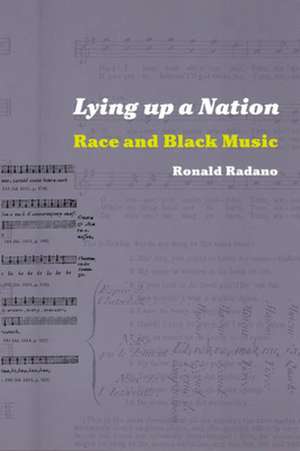Lying up a Nation: Race and Black Music
Autor Ronald M. Radanoen Limba Engleză Hardback – 6 noi 2003
What is black music? For some it is a unique expression of the African-American experience, its soulful vocals and stirring rhythms forged in the fires of black resistance in response to centuries of oppression. But as Ronald Radano argues in this bracing work, the whole idea of black music has a much longer and more complicated history-one that speaks as much of musical and racial integration as it does of separation.
Preț: 558.50 lei
Preț vechi: 720.85 lei
-23% Nou
Puncte Express: 838
Preț estimativ în valută:
106.87€ • 112.86$ • 88.94£
106.87€ • 112.86$ • 88.94£
Carte indisponibilă temporar
Doresc să fiu notificat când acest titlu va fi disponibil:
Se trimite...
Preluare comenzi: 021 569.72.76
Specificații
ISBN-13: 9780226701974
ISBN-10: 0226701972
Pagini: 440
Ilustrații: 2 halftones, 4 line drawings, 26 musical examples
Dimensiuni: 152 x 229 x 30 mm
Greutate: 0.69 kg
Ediția:1
Editura: University of Chicago Press
Colecția University of Chicago Press
ISBN-10: 0226701972
Pagini: 440
Ilustrații: 2 halftones, 4 line drawings, 26 musical examples
Dimensiuni: 152 x 229 x 30 mm
Greutate: 0.69 kg
Ediția:1
Editura: University of Chicago Press
Colecția University of Chicago Press
Notă biografică
Ronald Radano is a professor of music at the University of Wisconsin-Madison. He is the author of New Musical Figurations: Anthony Braxton's Cultural Critique and coeditor of Music and the Racial Imagination, both published by the University of Chicago Press.
Cuprins
Contents
List of Illustrations
Preface
1. Telling Stories, Telling Lies Revisionist Listening and the Writing of Music History
2. Resonances of Racial Absence Black Sounding Practices Prior to "Negro Music"
3. First Truth, Second Hearing Audible Encounters in Antebellum Black and White
4. Magical Writing The Iconic Wonders of the Slave Spiritual
5. Of Bodies and Souls Feeling the Pulse of Modern Race Music
Epilogue- A Nation's Gift
Notes
Index
List of Illustrations
Preface
1. Telling Stories, Telling Lies Revisionist Listening and the Writing of Music History
2. Resonances of Racial Absence Black Sounding Practices Prior to "Negro Music"
3. First Truth, Second Hearing Audible Encounters in Antebellum Black and White
4. Magical Writing The Iconic Wonders of the Slave Spiritual
5. Of Bodies and Souls Feeling the Pulse of Modern Race Music
Epilogue- A Nation's Gift
Notes
Index
Recenzii
“Radano’s work traces how modern race thinking and black music marked intertwined phenomena, investing black performance and a variety of genres with essential properties, myths of origin, and social power in ways that buttressed as well as eroded racial hierarchy in American society. . . . Radano’s clear, incisive modeling of ‘music’ as a performative, textual, and social phenomenon that must be interrogated historically rather than essentialized is particularly welcome.”
“Radanmo provides tremendous insight into the contours of eighteenth- and nineteenth-century discourses around black music in all their subtlety and ideological effect. Through his examination of the resonances of black music, he offers an inventive and valuable method for understanding how black musical meaning is forged at the nexus of sonic productions, discursive representations, and social transformations. Moreover, by asking difficult questions about the relationship of black music scholarship to legacies of racism, this promises to be an influential book that is sure to be at the center of many productive debates for years to come.”
“What Radano does do, with dialectical brilliance and telling historical precision, is make a series of interventions in the received narrative of black musical ‘becoming’ on American soil.”
"Radano offers a provocative reconceptualization of African American music history in terms that up the theoretical ante for the field as a whole. . . . His painstakingly thorough examination of primary source materials situated within his sharply critical surveys of relevant scholarly literature, provide thought-provoking support for the maverick historiographical positions he proposes."
